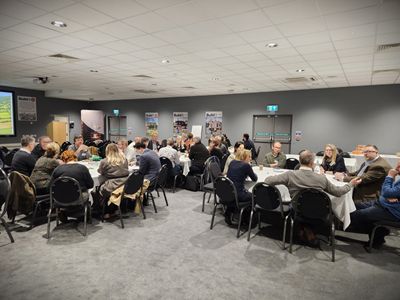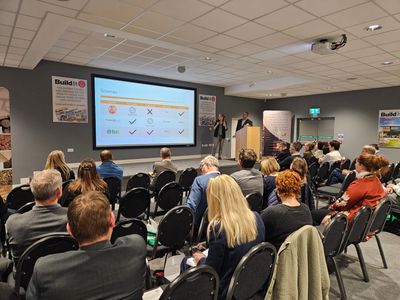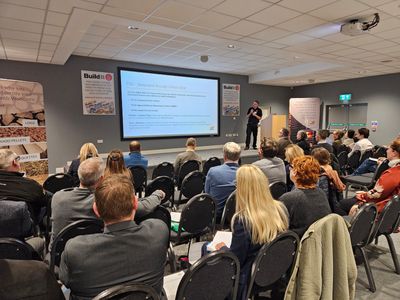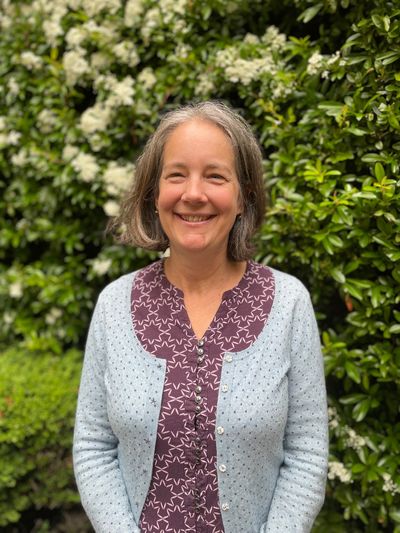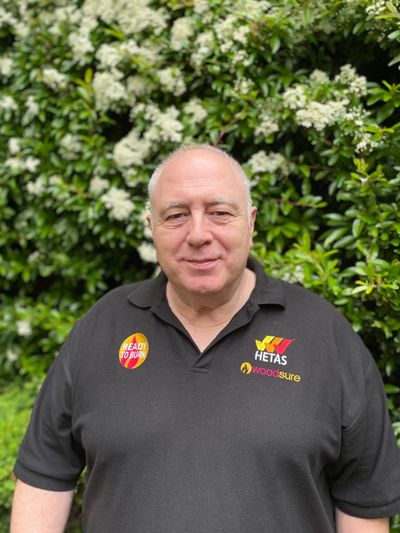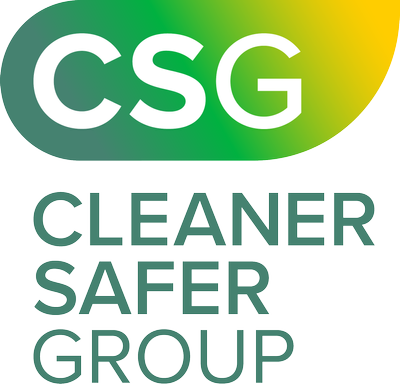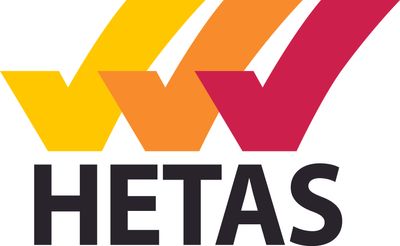“United and robust”: solid fuel and biomass industry comes together to collaborate under new not-for-profit Cleaner Safer Group
Published:
Read Time: 6 mins
10th December 2024, UK: Local Authorities, industry leaders and key stakeholders across the biomass and other solid fuel industries unite under the newly launched Cleaner Safer Group (CSG), to discuss how they can work together to achieve a cleaner, safer, and more sustainable environment.
Hosted at the National Self Build and Renovation Centre in Swindon, the Cleaner Safer Group 2024 conference ‘Innovating for a Sustainable Tomorrow’ was the not-for-profit organisation’s first event since its launch earlier this year. Over 40 industry representatives were in attendance, including manufacturers, industry bodies, local government representation and sector professionals.
The new not-for-profit organisation, CSG, will build on the work of its sister organisations HETAS and Woodsure, bringing together each organisation’s resources, expertise and stakeholders. In addition, CSG will work to expand into new markets, applying its knowledge and specialist skills to new sectors, mitigating safety and environmental risks. CSG aims to work with, partner and support organisations and businesses working in these sectors.
After an introduction from Kaye Welfare, Cleaner Safer Group Chair, attendees heard from Calvin May, HETAS Head of Technical Services, who gave an insightful presentation on the solid fuel industry’s current progress, HETAS developments, and CSG’s mission for the future. A key consideration raised was the likely developments to the Government’s Environmental Improvement Plan (EIP), which outlines the actions needed to improve the UK environment, due to be announced later this year:
Calvin said: “The Environmental Improvement Plan (EIP) is a noteworthy piece of government documentation. Any developments and changes from the review of the plan by Government, which are due by the end of the year, should be monitored closely and acted upon as collaboratively as possible. A joined-up approach between professionals within the biomass industry and the sharing of knowledge will empower a drive for change towards a more sustainable environment.
“The biomass and solid fuel industry has demonstrated how well it can reply effectively to changes in legislation as well as updates to research and data – such as the review of the impact of domestic combustion on UK air quality, Defra's Emissions of Air Pollutants in the UK report and its Air Pollution in the UK report. With the imminent rapid review of the EIP likely bringing further changes to help the UK meet its ambitious emissions targets, we must continue to work together in preparation to help others in the sector – including consumers – make cleaner, safer and more sustainable choices.”
Alan Young, HETAS Quality Assurance Manager, continued the theme of looking ahead, examining the areas that drive change within the biomass and solid fuel industries, and how upskilling to help create unity across government departments and industry sectors can help continue to drive change and empower growth:
“Solid fuel industry legislation and regulations currently span across three government departments – Defra (The Department for Environment, Food & Rural Affairs), DESNZ (The Department for Energy Security and Net Zero), and MHCLG (The Ministry of Housing, Communities and Local Government). With no tangible link, this fragmentation results in gaps in knowledge, understanding and representation across government and legislation.
As we move forward and the factors influencing change within the biomass and solid fuel industries – such as politics, the environment and society - intertwine, filling those gaps will be key to growth and development. This can, in part, be achieved by upskilling existing engineers who can act as a bridge, so to speak, between industries, government departments, and even disciplines.
“Due to its operation with the additional insights of HETAS, Woodsure and the certification and accreditation schemes they administer – such as Defra’s Ready to Burn scheme and the Cleaner Choice scheme - as well as the expertise of key stakeholders involved, CSG is in a very unique position to help build that much-needed bridge. This will allow for an even more comprehensive view of solid fuel, where expertise from multiple industries and sectors is combined."
Jason Harries, Head of Woodsure, and Helen Bentley-Fox, Director of Woodsure, rounded off the presentations with an examination of the current wood fuel sector. Both looked at where the sector needs to be and ways in which industry collaboration can encourage compliance as global developments continue to arise, such as the expected legislative updates to the EU Deforestation Regulation.
Jason said: “As the UK’s only wood fuel quality assurance scheme, Woodsure plays a key role in the wood fuel industry. This is a strong position that can be built upon, with our experience in administering both the Ready to Burn scheme and the Biomass Suppliers List granting us the expert knowledge to bring about meaningful change.
“It is important that we, as an industry, keep driving forward with a clear, joined-up voice and a unified goal, informing and instructing all UK Governments on current industry progress and necessary changes. Aligning devolved administrations and educating consumers on the importance of high-quality, locally sourced wood fuel will further strengthen the position of wood as a viable, sustainable and safe source of fuel.
Helen added: “The recent delay of the implementation of the EU Deforestation Regulation (EUDR) is a key example of the way that a collaborative wood fuel industry can create effective change. This delay could see the UK become a dumping ground for illegal timber, with the potential to negatively impact our local suppliers, wood fuel quality, and biosecurity, unless swift and united action is taken.
“The delay now grants the wood fuel industry the time and opportunity to call for much-needed action from the UK Government, but this call must be clear and informed in order to be effective and to avoid any knock-on effects across the wider solid fuel and biomass sector. By unifying our message across sectors, from wood fuel to biomass to appliance manufacturing and more, we can ensure that the future of the wood fuel sector and the wider biomass and solid fuel industry is one based on collaboration and a drive for cleaner, safer and more sustainable choices.”
The presentations were followed by breakout sessions, which saw industry leaders and experts from a variety of fields – ranging from technical and certification to business and local authorities – come together, ideate, and inform one another.
The topics of cross-sector collaboration and a more unified message across the solid fuel and biomass industries remained a hot topic, with many agreeing that this kind of unification is what is needed to drive change and deliver a more sustainable and robust sector that is united in championing cleaner and safer choices.
Kaye Welfare, Cleaner Safer Group Chair, rounded off the Conference:
“It was my pleasure to introduce Cleaner Safer Group to our attendees and I am incredibly pleased by the responses we received. We are looking forward to building on the strong foundations of HETAS and Woodsure to evolve, expand, and innovate.
“Collaborative efforts are the foundation of change, and this event demonstrated the passion for that across our industries. I hope we can continue to build on that passion and use it to work together for a cleaner, safer, and more sustainable environment.”
Ends
Editors notes
Cleaner Safer Group (CSG) is a not-for-profit organisation, operating with the mission of working together for a cleaner, safer, more sustainable environment. The organisation offers a range of services – both directly and through HETAS and Woodsure - such as business consultancy, testing facilities training, contract management and certification schemes.
CSG is the parent company of HETAS and Woodsure, both of which specialise in certification schemes in the solid fuel and biomass sector. Each organisation operates its own specialist certification schemes, as well as running contracted schemes on behalf of government, including the Ready to Burn certification schemes for wood and manufactured solid fuels, the Biomass Suppliers List and smoke control exemption for appliances.

